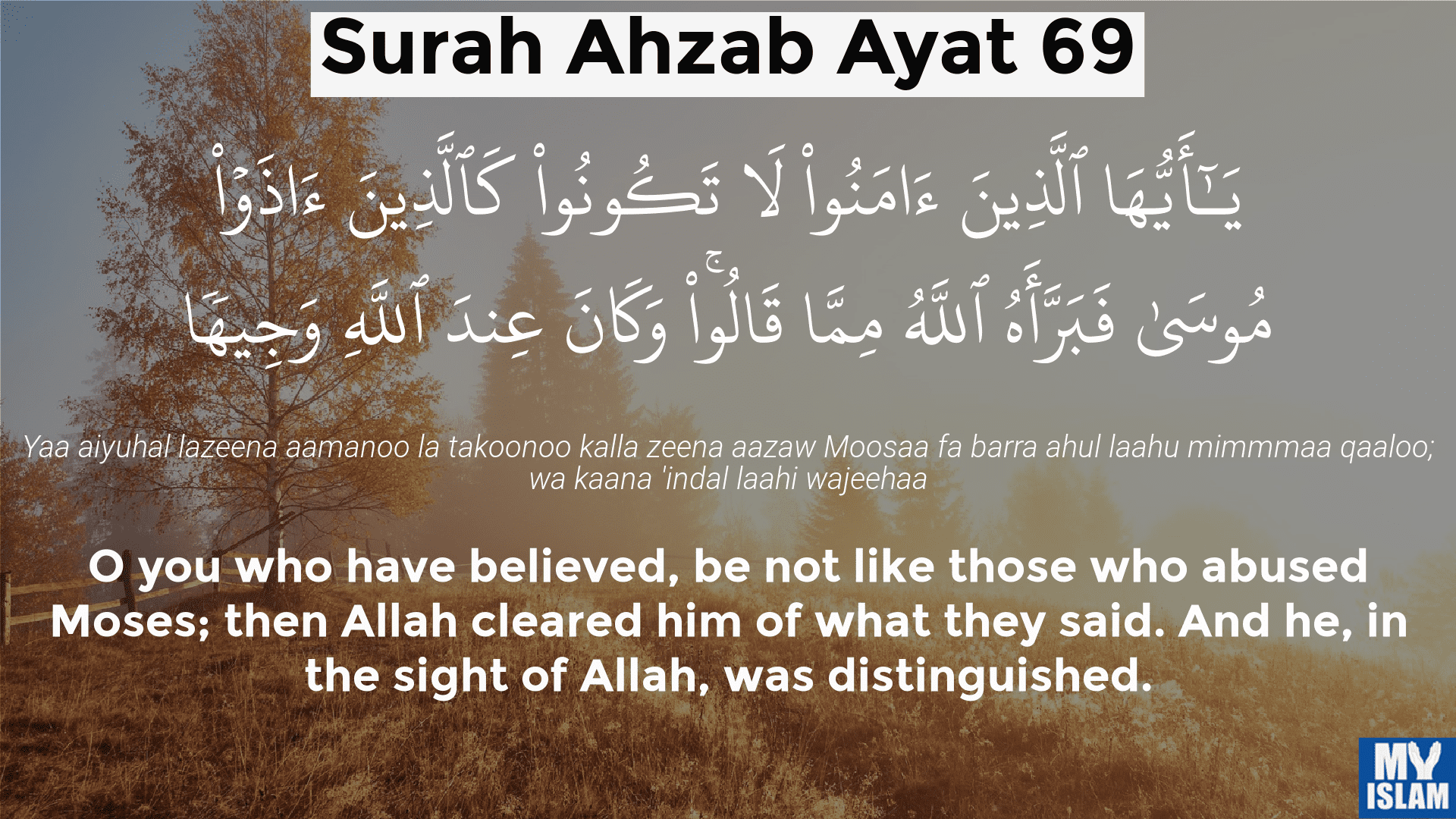Surah Ahzab Ayat 69 in Arabic Text
English Translation
Here you can read various translations of verse 69
O you who have believed, be not like those who abused Moses; then Allah cleared him of what they said. And he, in the sight of Allah, was distinguished.
O ye who believe! Be ye not like those who vexed and insulted Moses, but Allah cleared him of the (calumnies) they had uttered: and he was honourable in Allah’s sight.
Believers, do not be like those who distressed Moses and then Allah declared him quit of the ill they spoke about him; and he had a high standing with Allah.
O you who believe! Be not like those who annoyed Musa (Moses), but Allah cleared him of that which they alleged, and he was honourable before Allah.
O ye who believe! Be not as those who slandered Moses, but Allah proved his innocence of that which they alleged, and he was well esteemed in Allah’s sight.
O you who have believed, do not be as the ones who hurt Mûsa, (Moses) yet Allah (declared) him quit of what they said, and he has been esteemed in the Providence of Allah.
Believers, do not be like those who insulted Moses- God cleared him of their allegations and he was highly honoured in God’s eyes.
اے ایمان والو! ان لوگوں جیسے نہ بن جاؤ جنہوں نے موسیٰ کو تکلیف دی پس جو بات انہوں نے کہی تھی اللہ نے انہیں اس سے بری فرما دیا، اور وه اللہ کے نزدیک باعزت تھے
Quran 33 Verse 69 Explanation
For those looking for commentary to help with the understanding of Surah Ahzab ayat 69, we’ve provided two Tafseer works below. The first is the tafseer of Abul Ala Maududi, the second is of Ibn Kathir.
Ala-Maududi
(33:69) Believers,[118] do not be like those who distressed Moses and then Allah declared him quit of the ill they spoke about him; and he had a high standing with Allah.[119]
118. One should note that the Quran has at some places addressed the true Muslims with: “O you who have believed,” and at others places the Muslim community as a whole, which includes the believers as well as the hypocrites and the Muslims of the weak faith, and at still others places only the hypocrites. When the hypocrites and the Muslims of the weak faith are addressed with: “O you who have believed,” it is meant to put them to shame, as if to say, “You claim to have affirmed faith, but your acts and deeds do not support your claim.” A little study of the context can easily show which class of the people has been addressed at a particular place. Here, obviously, the common Muslims are being addressed.
119. In other words, it means: “O Muslims, do not behave like the Jews. You should not behave towards your Prophet (peace be upon him) as the children of Israel behaved towards the Prophet Moses (peace be upon him).” The Israelites themselves admit that the Prophet Moses (peace be upon him) was their greatest benefactor. Whatever they achieved as a nation was only due to him: otherwise in Egypt they would have been doomed to a worse fate than that of the Shudras in India. But how the Israelites treated the greatest benefactor of theirs can be judged by a cursory glance at the following places of the Bible: Exodus, 5: 20-21, 14: 12, 16: 2-3, 17: 3-4. Numbers, 11:1-15, 14:1-10, 16 (the whole chapter), 20: 1-5.
The Quran by referring to this ingratitude of the children of Israel, warns the Muslims, so as to say: “Refrain from adopting this same attitude towards Muhammad (peace be upon him); otherwise you should be ready to face the same fate as the Jews.”
This same thing was said by Prophet (peace be upon him) himself on several occasions. Once he was dividing some goods among the Muslims. When the people dispersed, a man said; “Muhammad in this division has shown no regard for Allah and the Hereafter.” Abdullah bin Masud heard this remark and told the Prophet (peace be upon him) what had been said concerning him that day. He replied, “May Allah show mercy to Moses (peace be upon him): he was maligned even more severely, but he showed patience.” (Musnad Ahmad, Tirmidhi, Abu Daud).
Ibn-Kathir
69. O you who believe! Be not like those who annoyed Musa, but Allah cleared him of that which they alleged, and he was honorable before Allah.
Al-Bukhari recorded in the Book of Hadiths about the Prophets, that Abu Hurayrah said that the Messenger of Allah said:
(Musa, peace be upon him, was a shy and modest man who would never show anything of his skin because of his shyness. Some of the Children of Israel annoyed him by saying: “He only keeps himself covered because of some defect in his skin, either leprosy or scrotal hernia or some other defect.” Allah, may He be glorified, wanted to clear Musa, peace be upon him, of what they were saying. One day Musa was alone, so he took off his garment and put it on a rock, then he took a bath. When he had finished, he turned back to pick up his garment, but the rock moved away, taking his garment with it. Musa picked up his stick and chased the rock, saying, “My garment, O rock! My garment, O rock!” Until he reached a group of the Children of Israel, who saw him naked and found that he was the best of those whom Allah had created. Thus he was cleared of what they had said about him. Then the rock stood still, so he took his garment and put it on. He started hitting the rock with his stick, and by Allah, the marks of that beating were left on the rock, three or four or five. This is what is referred to in the Ayah: (O you who believe! Be not like those who annoyed Musa, but Allah cleared him of that which they alleged, and he was honorable before Allah.)) This Hadith is one of those which were recorded by Al-Bukhari but not Muslim. Imam Ahmad recorded that `Abdullah (bin Mas`ud) said: “One day, the Messenger of Allah distributed some booty and a man among the Ansar said, `This division was not done for the sake of Allah.’ I said, `O enemy of Allah! I am going to tell the Messenger of Allah what you have said.’ So, I told the Prophet about it. His face reddened and he said,
(May Allah have mercy on Musa. He was annoyed with worse than this, yet he remained patient.)” This was recorded in the Two Sahihs.
(and he was honorable before Allah. ) means, he had a position of status and honor before his Lord, may He be exalted and glorified. Al-Hasan Al-Basri said: “His supplications would be answered by Allah.” Some of them said that part of his great standing before Allah was that he interceded for his brother Harun, asking Allah to send him with him as a Messenger, and Allah granted his request and said:
(And We granted him his brother Harun, (also) a Prophet, out of Our mercy.) (19:53)
Quick navigation links






